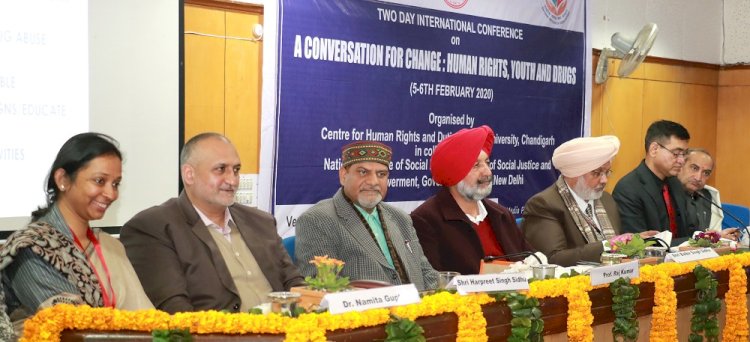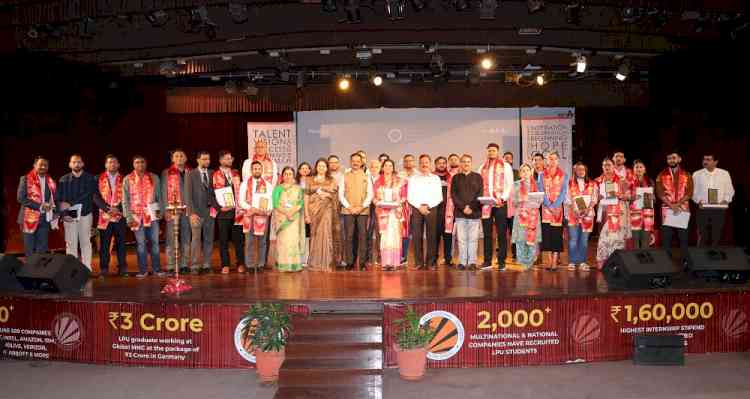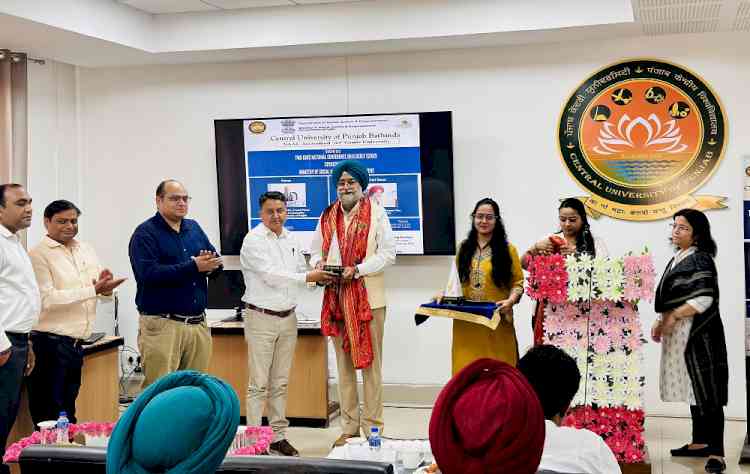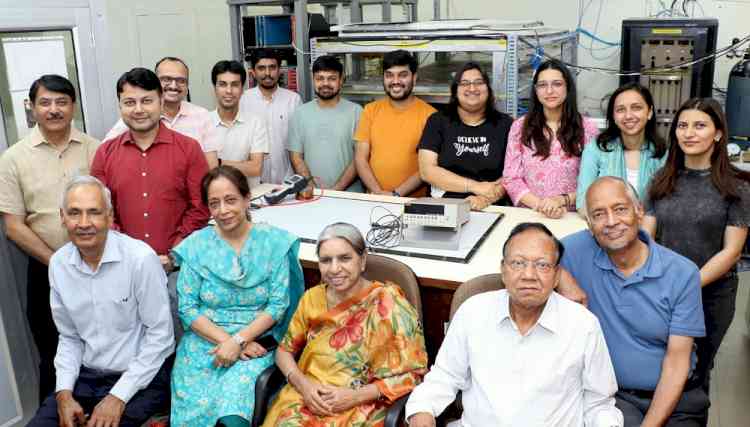2 Day international conference at PU
Conversation for change: human rights, youth and drugs inaugural session

Chandigarh: Centre for Human Rights and Duties, Panjab University, Chandigarh in collaboration with National Institute of Social Defence, Ministry of Social Justice and Empowerment, Government of India, New Delhi organized Two Days International Conference on the theme ‘A Conversation for Change: Human Rights, Youth and Drugs, 05-06th February, 2020. Prominent delegates from various related fields were invited to deliberate on very sensitive issue of ‘Youth and Drugs’. The conference was divided into different sessions presided over by the experts from the field.
Shri Balbir Singh Sidhu, Health and Family Welfare Minister, Government of Punjab in his inaugural address talked about the history of drug menace in the state of Punjab. He also added that due to unemployment drug menace has increased. He requested the youth to control the use of drugs and to spread awareness about the same in the society. He announced a grant of Rs 2 lakhs to the Centre to carry out more such activities in the future.
Shri Manmohan Singh, IPS, Additional Director, Intelligence Bureau, Chandigarh in his address discussed the present scenario of drugs in India and how the issue of drugs is related to human rights. He emphasized that to tackle the drug menace, focus should be laid on 3 Es: Engineering (Social), Education (Awareness) and Enforcement of Laws. While tracing the origin of the problem of drug menace in Punjab, he mentioned the role played by various international and national bodies, NGOs, etc. in safeguarding the rights of the people. He emphasized on the importance of duties and how rights and duties are complementary to each other. He added that it is very important to understand our own duty towards nation which will minimize the breaches of rights. He also mentioned the position of women in a drug addict family and what hardships they have to face after the demise of male drug addict members of the family. He concluded his talk by stating that “Together we can bring the change.”
Shri Harpreet Singh Sidhu, IPS, ADGP, Special Task Force, Punjab in his inaugural address comprehensively discussed about “Comprehensive Actions Against Drug Abuse”, a strategy developed by Government of India. He mentioned about the importance of forming a strategy to control drug abuse. An effective strategy for such an issue should be formed on the basis of enforcement, de-addiction and preventive measures. He also raised a concern regarding lack of national prevention programs in the country. He also added that awareness alone will not solve the problem, behavioral change is required. We need to strengthen the protective factors that can help the youth. He also discussed about Buddy Programme and DAPO Programme initiated by Government of Punjab. In the conclusion he said “Do not think of it as a war it’s a process, in which we all are a part.”
Shri Veerendra Mishra, Director, NISD, Ministry of Social Justice and Empowerment, Govt. of India, New Delhi while applauding the theme of the conference stated that adding the word ‘conversation’ itself under the theme depicts the positivity of the conference. He divided his session into two parts by identifying this problem with both criminal justice system and social justice system. He also discussed about the importance of duties. He stated that according to a survey only 5% of heroine is seized and 95% is still in the market. He explained the importance of the theme as Indian population majorly consists of youth and how this problem of drug menace has turned the Indian youth dividend into a burden. He raised his concerns on sensitization and awareness programs in collaboration with NGOs and society. He also discussed about ‘Corporate Volunteerism’. In the conclusion, he requested the audience to join hands for discussing such important issue in a two day conference to bring change.
Earlier, Prof. Raj Kumar, Vice Chancellor in his welcome address emphasized that the problem of drugs can be solved by involving counselors. He also laid emphasis on involving school children from higher classes to make them aware about the issues related to drug menace. He further emphasized that the colleges and schools at border area are of high importance because of smuggling of drugs. Awareness programs need to be organized from time to time to address this issue so that the youth and society becomes more vigilant to such issues. He also added that involvement of general public along with the academic institutions and government institutions is also very important in curbing this menace. He suggested that such programs should have some informal sessions where people can give the practical ideas and inputs which can be taken into consideration which framing policies.
TECHNICAL SESSION
The inaugural session was followed by various Technical Sessions to have comprehensive analysis of the issues and bring out the best solutions and provide deep insight about the theme. Various Technical Sessions were held based on different themes like ‘Drug Abuse and Human Rights Challenges in South Asia’, ‘Drug Prevention , Treatment And Care’ and Youth And Civil Society: Journeys of Change And Intervention to enlighten and dwell more on the burning issue of drug abuse.
Prof. Devinder Singh, Department of Laws, Panjab University, Chandigarh was the Chair for the 1st Technical Session. He stated that family is the most important component of society and it is high time that rather than putting everything on State, we should give more time to our children in family so that they do not go for drug addiction.
Shri Praveen Kumar Sinha, IPS, ADGP Prisons, Punjab discussed about “Drug Abuse Challenge in South Asia in Prisons, in Punjab.” He also added how the drug abuse is more prevalent in the prison. He talked about the overcrowding of prisons which is a problem of many countries and not only of India. He talked in detail about the challenges faced by prisons in Punjab such as old infrastructure, lower use of technology by prison administration, poor maintenance, funding issues and high number of cases under trial. Prisoners are more prone to drug abuse. He emphasized that “severity of punishment is not deterrence, surity of punishment is the deterrence.” He further talked about Drug Abuse and Human Rights Challenges in Punjab in which he emphasized on de-addiction, stopping supply of drugs, breaking the criminal nexus and corrupt practices.
Prof. R.S. Ghuman, CRRID, Chandigarh, shared the outcomes of his study carried out in collaboration with United Nations. He stated that drugs violate the basic right to life. He mentioned the Sustainable Development Goals (SDGs) and how international agencies have played an important role in curbing drug menace. He discussed the problem of drugs faced by the Southeast Asian countries. The major issues on drugs which these countries face are substitution of pharmaceutical drugs, abuse of pharmaceutical drug use and abuse of illicit drugs. He further explained that the major cause that lead to poor treatment of drug addicts are that the treatment is very expensive. Another reasons were unemployment and easy money. He raised his concern about door to door supply of drugs through peddlers and also involvement of political parties as suppliers of drugs. While concluding he talked about the probable multidimensional solutions i.e. consisting of social, economic, political and cultural factors. Economics of drugs is very important to overcome this menace.
Shri K.P.S Malhotra, IPS, Zonal Director, Narcotic Control Bureau of India, New Delhi focused on the complex web of being a drug addict. He explained about various channels through which drugs are supplied and how easily these suppliers approach youth and sell them drugs. He also talked about various misleading causes which leads the youth to indulge into drugs abuse. He discussed about the various stages through which drugs come into the market i.e. the raw material stage, processing stage and the final logistics and transportation stage. He also talked about the drug peddlers who are the main sources of supplier and how they approach innocent youngsters and they lure them to use those drugs. He talked about “Combating Trafficking: Role of Law Enforcement Agencies”. He critically analyzed the reasons why youth is attracted to drugs.
Dr. Kunal Saxena, MD, Rusan Pharma Limited, Mumbai discussed about how the concept of harm reduction is accepted globally. He talked about the “Mathedon Maintenance Programme” which is hosted by 15 centers in India including Punjab. He also described in detail about various medicines which are used in harm reduction programs in India.
Ms. Neha Singhal, Vidhi Centre for Legal Policy, New Delhi, talked about deterrence theory of punishment. She mentioned that how the principles of deterrence theory has been used in providing punishment under the NDPS Act, 1985, which is problematic in nature. She also mentioned other issues which are violative in applying the law by police for example the similar language which has been used under many charge sheets. She stated that Sikkim is the only state which doesn’t use deterrence model in case of drug addicts. She concluded with putting question on the limits of law and do we sill need this model of prohibition? She also added that law often makes addicts worst than they already are.
Dr. Namita Gupta, Chairperson Centre for Human Rights and Duties, Panjab University, Chandigarh, introduced the theme of the conference. She explained how the problem of drug addiction has become global affair, due to this every country struggling to get rid of it. But this problem has taken different shape over years in the Northern region of India affecting the majority of youth population, which in itself a serious issue. India being between the Golden Crescent and Golden Triangle, both corners of India are victims of massive drug exports, while U.T. Chandigarh being on the North-Western corner is the most affected. The Report also revealed that the number of people who use drugs is now 30 per cent higher than it was in 2009. While 35 million people worldwide suffer from drug use disorders, only 1 in 7 people receive treatment. She also stated that the core objective of the conference is to bring together government officials, policy makers, leading scholars, substance abuse treatment providers and representatives from de-addiction centres to discuss opportunities, strategies and challenges in drug menace, research, prevention and treatment.
The Technical Session Round I concluded with the active participation and brain storming question answer round between the eminent panelists and the audience.


 cityairnews
cityairnews 








